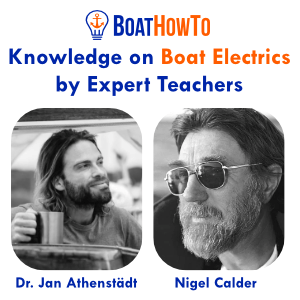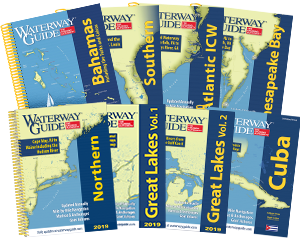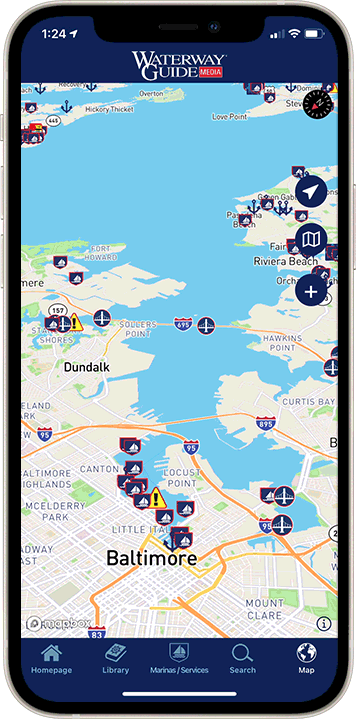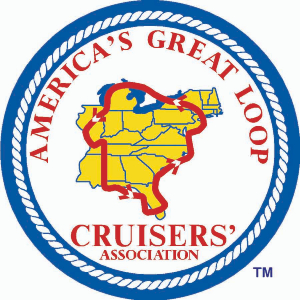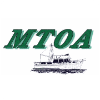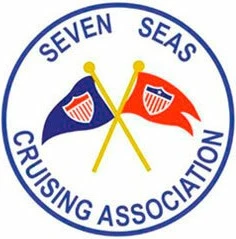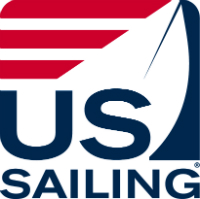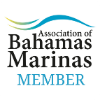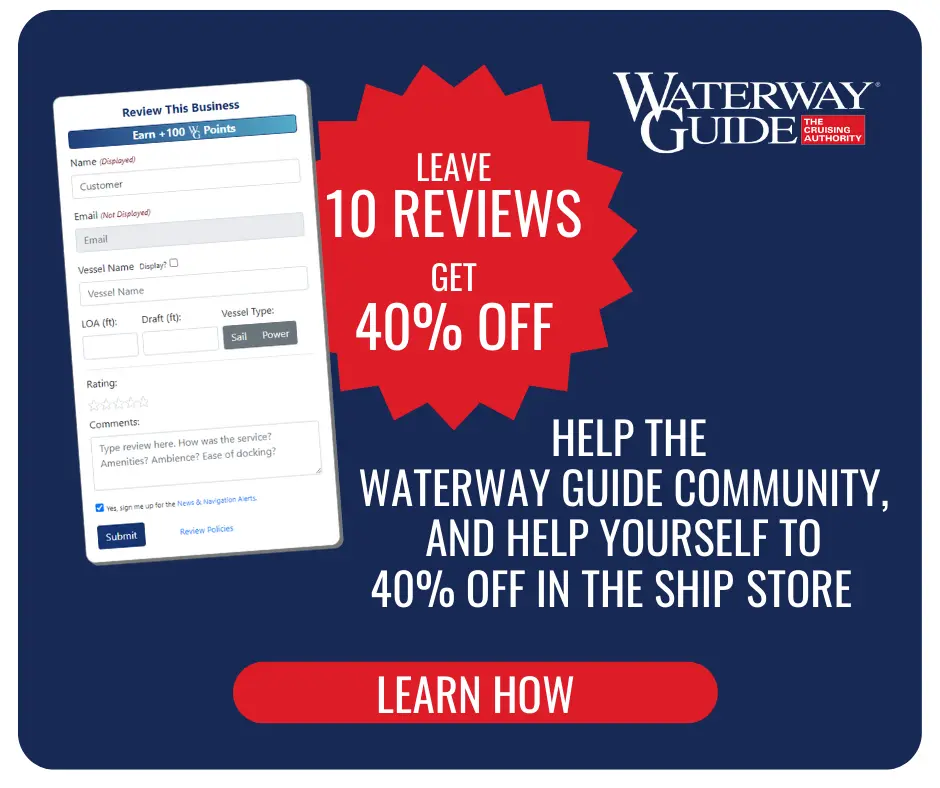
Imagine gently swinging on the hook aboard your perfect boat. At the end of a spectacular day of boating you are sipping on a chilled beverage while watching a storm roll in. First you notice the darkening of the sky competing with the setting sun, resulting in a spectacular rainbow. Then as the wind picks up, you feel the gooseflesh rising on your sunburned arms. Next, white caps top the waves as your boat clocks around 180 degrees, along with the other boats at anchor in the harbor like a choreographed dance, with the wind providing the accompanying music. The rain begins to fall as the final crescendo…
If you found your perfect boat then you hope to experience the above scenario–a great day of boating and a quiet evening at anchor, safely tucked in to enjoy and reflect. But is there such a thing as the perfect boat and how do you find that perfect boat without also encountering unwanted maintenance surprises, which could make this scenario very different?
First, you must be true to yourself to zero in on a boat that is within your budget and will be the right boat for your mission. Be realistic in the type of boat you need for the type of boating you want to do. Do you dream of crossing oceans or will most of your cruising be less than 100 miles from home? Intracoastal waterways are best enjoyed aboard a more shallow-draft boat, rather than one made for primarily cruising off shore. A sharp and dedicated buyer's broker can point you in the right direction of that perfect boat, but the final step to be sure that this is the perfect boat for you is accomplished through the survey.
You may erroneously believe that you will uncover all the warts and bumps of a particular boat with a good survey conducted prior to purchase. But that doesn't always happen. An incomplete survey offers incomplete results. And even the most exhaustive and thorough survey report can be misunderstood–or worse yet–ignored by the very person who needs this information…you! Too many times we see people decide on the perfect boat with stars in their eyes and complete disregard for the deficiencies noted in the survey.
Now let's look at the above anchoring scenario you may encounter if you do not heed the reported survey deficits:
After a glorious day on the water you select your spot for the evening and begin to lower the anchor. That rust on the chain should rinse off when you lower it overboard, right? The weakest link keeps playing in the back of your mind. But first you must fix the windlass clutch that's slipping. You make a mental note to add that to your growing maintenance and repair list. In the meantime, you decide to just let the chain play out as you back up. You need enough chain for the depth…but is the depth gauge reading under the keel or at the water surface? That can make a big difference. Spying the darkening clouds, you study your RADAR to see which way the storm is moving. Hmmm. You can't read the RADAR screen with all the clutter that you can't seem to filter out. And another item goes on the maintenance/repair list. You decide to simply let out more anchor rode to increase the scope in case the winds do pick up. "We can do this. It's our perfect boat," you think. Well darn! The winds are now building and it's time to let out more rode….100 more feet should do it. Uh-oh! There goes the bitter end over the bow. Apparently the rode wasn't attached to the boat inside the anchor locker. Was that on the survey report? Quickly you start the main engine and head for the nearest marina. Splat! The flybridge canvas and curtains are flapping as the rains pelt but the lower helm isn't an option, as it has no working navigation equipment. That's on the list too but you thought you could do without for now. As you hustle into the channel you call on the static-filled VHF to make a reservation…and we could go on and on and on about what else could go wrong.
Perfect boat? Maybe it does have all the boxes checked–the right number of staterooms/heads, a nice enough galley and plenty of outside deck space. But if you failed to heed some of the basic equipment deficiencies from the survey report, your dream boat could quickly become a nightmare. Or, maybe the surveyor wasn't the most detailed-oriented guy, but you were so excited about scheduling the sea trial and survey, you hired the only surveyor available right away (which might have been a hint). Caveat emptor.
So how can you make some lemonade out of these sour lemons? Most importantly, learn what to look for when you are boat shopping. There's "nice to have" and then there's "need to have" items. For the best end result, you and your crew members should work together on what is important to each of you. Then tell your broker what brings you joy and let the expert find the right boat for you and your mission.
Next, it is essential to find a good surveyor and participate as an active buyer. Select a surveyor with experience on the type of boat you are considering. Check with your prospective insurer for some names and be sure they are accredited by a recognized marine survey organization, such as NAMS or SAMS. And we recommend you hire both hull and engine surveyors so you have more data to make an informed decision. A hull surveyor is a generalist and will inspect the entire vessel, including hull and contents. A competent engine surveyor will survey the engines, take fluid samples for a lab to analyze and participate in the survey sea trial, along with the vessel hull surveyor.
Then, be sure to use the detailed information you receive from your survey. Do not dismiss the negatives that are reported. Instead, use the documented deficiencies to make the best decision and take into account that all-important to do list. Many items can be easily repaired or replaced, and positive factors may compensate for any negatives.
Learn what to expect from a good survey: Who pays for it, what happens during the out-of-water inspection, the high-speed sea trial and other tests conducted during the sea trial, including:
- Hull, deck and superstructure inspections
- Cabin appointments
- Propulsion engine(s) performance
- Generator systems
- Electrical systems
- Fresh water, sanitation and sewage systems
- Steering and anchoring equipment
- Navigation electronics
- Thru-hull valves and bonding systems
- Safety equipment aboard
When you find your perfect boat, don't just fall in love with it. Let the expert surveyors guide you into making a smart and informed purchasing decision, then go enjoy the perfect sunset aboard your perfect boat, knowing it is all "A-OK!"
Captains Chris & Alyse Caldwell are USCG 100-ton Masters and Cruising Coaches who offer Personal Boat Training Online or Onboard your boat anywhere! The Caldwell's help build your cruising confidence with hands-on training, with their AskCaptainChris.com training videos and through two-day seminars filled with tons of tips for the boater who loves learning. If you have additional questions for Captains Chris or Alyse, please email them at [email protected]
